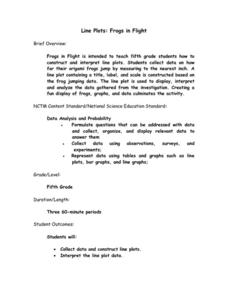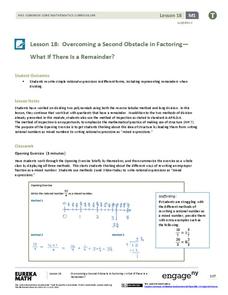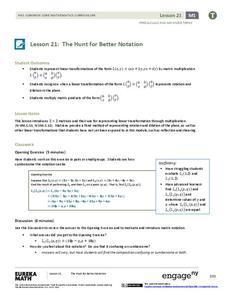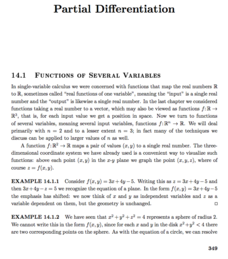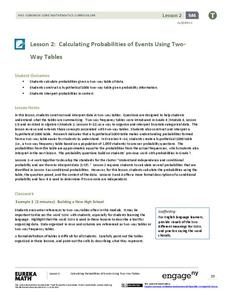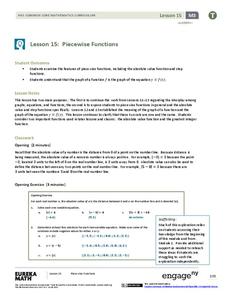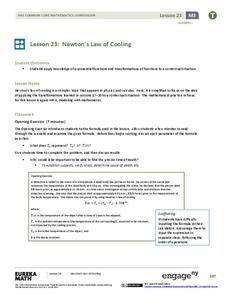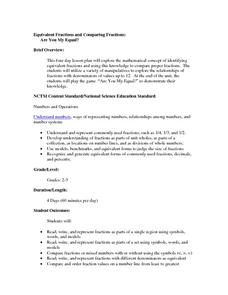EngageNY
End-of-Module Assessment Task - Geometry (module 1)
Have you hit a wall when trying to create performance task questions? Several open-ended response questions require a deep level of thinking. Topics include triangle congruence, quadrilaterals, special segments, constructions, and...
EngageNY
Normal Distributions (part 1)
Don't allow your pupils to become outliers! As learners examine normal distributions by calculating z-scores, they compare outcomes by analyzing the z-scores for each.
National Security Agency
Line Plots: Frogs in Flight
Have a hopping good time teaching your class how to collect and graph data with this fun activity-based lesson plan series. Using the provided data taken from a frog jumping contest, children first work...
EngageNY
Motion Along a Line – Search Robots Again
We can mathematically model the path of a robot. Learners use parametric equations to find the location of a robot at a given time. They compare the paths of multiple robots looking for parallel and perpendicular relationships and...
EngageNY
Overcoming a Second Obstacle in Factoring—What If There Is a Remainder?
Looking for an alternative approach to long division? Show your classes how to use factoring in place of long division. Increase their fluency with factoring at the same time!
EngageNY
The Hunt for Better Notation
The matrix — it's not just a movie. The lesson introduces the concept of 2 x 2 matrix multiplication as a way to represent linear transformations. Class members determine when a linear transformation represented as matrix...
Whitman College
Calculus - Early Transcendentals
This textbook takes the learner from the basic definition of slope through derivatives, integrals, and vector multivariable calculus. Each section is composed primarily of examples, with theoretical introductions and explanations in...
EngageNY
Similarity and the Angle Bisector Theorem
Identifying and verifying reproducible patterns in mathematics is an essential skill. Mathematicians identify the relationship of sides when an angle is bisected in a triangle. Once the pupils determine the relationship, they prove it to...
EngageNY
Using Trigonometry to Find Side Lengths of an Acute Triangle
Not all triangles are right! Pupils learn to tackle non-right triangles using the Law of Sines and Law of Cosines. After using the two laws, they then apply them to word problems.
Institute of Electrical and Electronics Engineers
Coloring Discrete Structures
What's the least number of colors needed to color a U.S. map? The lesson begins by having pupils view a video clip on continuous and discrete phenomenon, then launches into an activity reminiscent of Zeno's paradox. A separate video...
EngageNY
Finding Systems of Inequalities That Describe Triangular and Rectangular Regions
How do you build a polygon from an inequality? An engaging lesson challenges pupils to do just that. Building from the previous lesson in this series, learners write systems of inequalities to model rectangles, triangles, and even...
EngageNY
Calculating Probabilities of Events Using Two-Way Tables
Tables are useful for more than just eating. Learners use tables to organize data and calculate probabilities and conditional probabilities.
EngageNY
Construct an Equilateral Triangle (part 2)
Triangles, triangles, and more triangles! In this second installment of a 36-part series, your young mathematicians explore two increasingly challenging constructions, requiring them to develop a way to construct three triangles that...
EngageNY
Piecewise Functions
Show your class members that if they can graph a linear function, they can graph an absolute value function. Groups create an absolute value graph using a table, then entertain the idea of an absolute value function defined as two...
EngageNY
Newton’s Law of Cooling
As part of an investigation of transformations of exponential functions, class members use Newton's Law of Cooling as an exponential model to determine temperature based on varying aspects. The resource makes comparisons between...
Curated OER
Equivalent Fractions and Comparing Fractions
How can you tell if fractions have equal value? Use various collaborative activities to demonstrate the ways to determine whether or not fractions are equivalent.
Utah Education Network (UEN)
Probability and Statistics
MAD about statistics? In the seventh chapter of an eight-part seventh-grade workbook series, learners develop probability models and use statistics to draw inferences. In addition, learners play games and conduct experiments to determine...
A Mighty Girl
Gladys West
Teens might find it hard to imagine life before GPS. Using global positioning systems, they can quickly locate the nearest gas station, fast food establishment, or the home of a new friend. Introduce them to Gladys West, the lady who...
Curated OER
Advanced Art – Cultural Place-setting Still life
Upper graders view a series of films that depict rituals or celebrations as they occur in different cultural settings. They conduct a cultural investigation about one culture, brainstorm and research objects that have cultural or...
Miami University
Chapter Nine Worksheet: Monopoly
Advanced economics pupils analyze a series of graphs, data sets, and profit scenarios all related to monopolies and marginal revenue. They read through the background information, complete a graph using the data provided, and justify...
Curated OER
Advanced Coin Counting
In this math worksheet, students practice solving the problems for counting the coins in the advanced stage. The sheet is intended as a teacher's guide.
Curated OER
Advanced Sentence Completion: 11
In this sentence completion worksheet, students fill in the blank for the correct words for each sentence. Students complete 10 multiple choice questions. Click on "show all" to see the rest of the worksheet.
Curated OER
The Sound of Revolution
Students consider the impact of technological advancements. For this digital music lesson, students visit selected websites to discover information about CDs, MP3 players and file-sharing in order to determine how the music...
Curated OER
Using Negative Numbers
Sixth graders practice using negative numbers by completing number equations. In this math problem solving lesson, 6th graders discuss the different ways negative numbers can be used in a math problem and practice completing...




